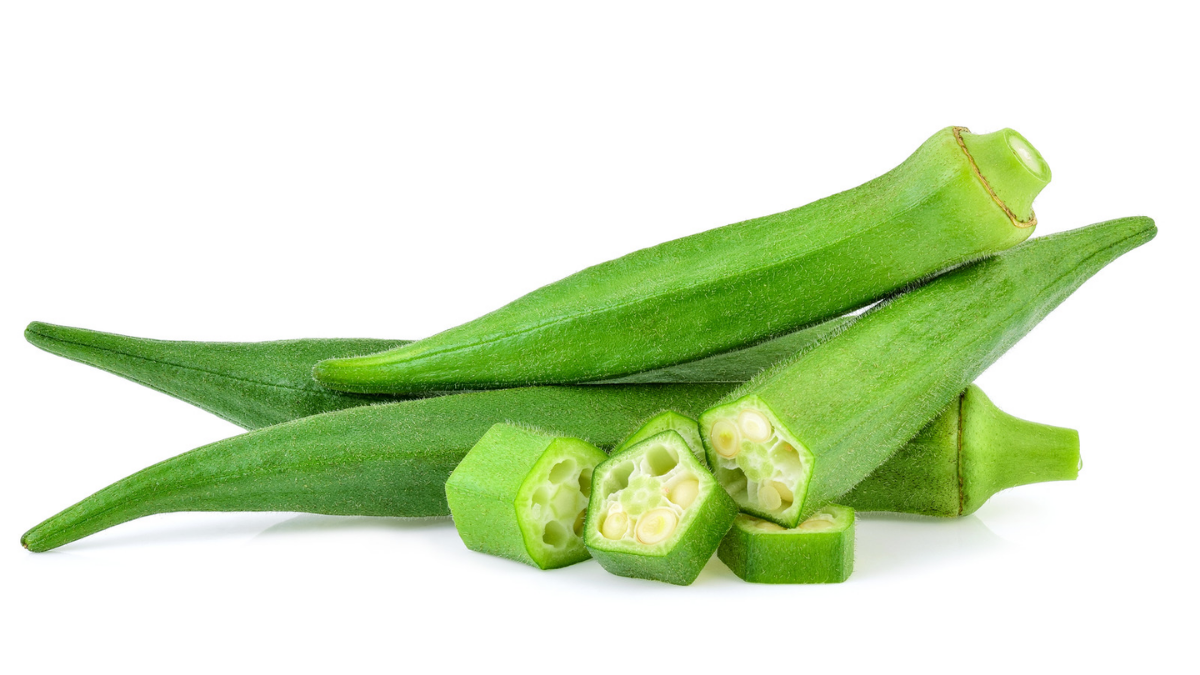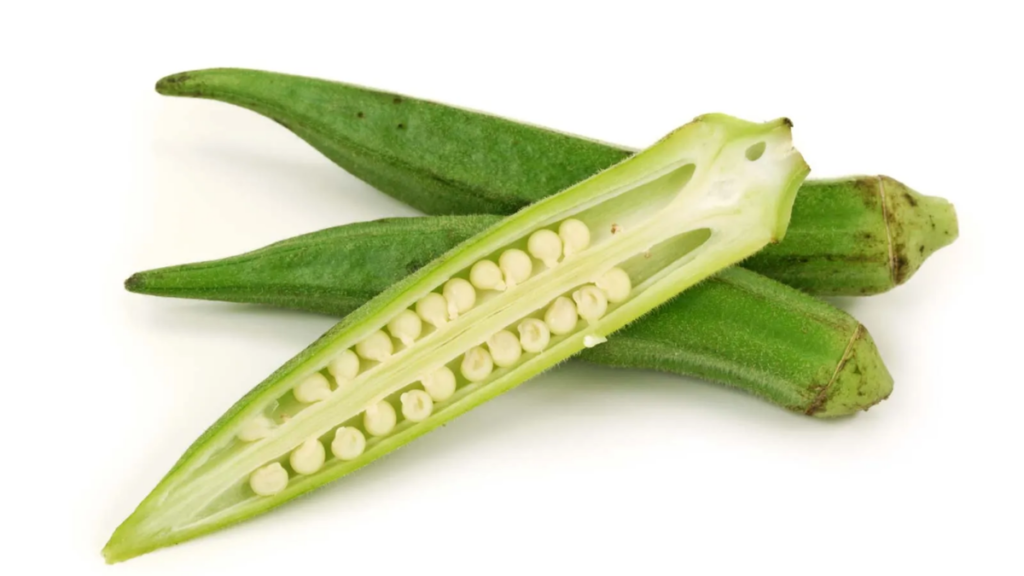Okra is a blooming plant with edible seed pods known as the “lady’s finger.” It thrives in hot conditions and is widely grown in Africa and South Asia. Though technically a fruit, okra is frequently cooked as a vegetable, and Okra is a common ingredient in gumbo. Okra has plenty of nutritional content despite not being a household name in healthy cuisine. Okra has few calories yet is high in nutrients. Okra contains vitamin C, which aids in immunological function, and Okra also contains vitamin K, which aids in blood clotting.
Okra Nutrition Facts
Okra’s Health Benefits
Okra is commonly used in soups and stews and can be found in many Southern cuisines, such as gumbo, and may be incorporated into your diet in various ways. When heated, okra can become slippery or slimy due to the mucilage. Cook okra over high heat in an uncrowded skillet to avoid the sticky texture. To minimize the sliminess of okra, pickle it.
Defeat Cancer
Antioxidants are natural substances that assist your body combat free radicals, which can cause cell damage. The most well-known effect of free radicals is oxidative damage, leading to cancer.
Polyphenols, including vitamins A and C, are antioxidants found in okra, and it also contains lectin, a protein that may stop cancer cells from growing in humans. The growth of breast cancer cells was suppressed by up to 63 percent in studies utilizing concentrated okra components. For definitive proof of okra’s cancer-fighting abilities, more research is needed.
Heart and Brain Health
Polyphenols prevent blood clots and reduce free radical damage, lowering your heart disease and stroke risk. Okra’s antioxidants may also help your brain by decreasing inflammation.
Mucilage, a thick, gel-like material found in okra, can bind to cholesterol and transport it through the body after digestion. After rats were fed a high-fat diet containing okra powder for eight weeks, blood cholesterol levels were lower.
Blood Sugar Management
Okra has been found in several studies to help regulate blood sugar levels. Okra, according to researchers, may help limit sugar absorption during digestion.
Purified okra and liquid sugar were given to rats in one study, and they experienced lower blood sugar spikes than the control group. More research is needed to prove that okra helps humans control their blood sugar levels.
Support During Pregnancy
Okra contains 15% of the daily intake of folate, an essential nutrient for pregnant women. Folate can help prevent neural tube abnormalities, harming a developing fetus’s brain and spine.
High in Antioxidants
Okra is high in antioxidants, which are suitable for your health. Antioxidants are dietary ingredients that protect against damaging chemicals known as free radicals. Polyphenols, such as flavonoids, isoquercetin, and vitamins A and C, are the most potent antioxidants in okra. Polyphenol-rich diets have been shown to benefit heart health by lowering the risk of blood clots and oxidative damage.
Polyphenols may also enhance brain health because of their capacity to reach the brain and defend against inflammation. These defence mechanisms could help preserve your brain from aging symptoms while enhancing cognition, learning, and memory.
Anticancer Properties
Okra includes lectin, a type of protein that may slow the growth of human cancer cells. The lectin in okra inhibited cancer cell development by up to 63 percent in a test tube investigation in breast cancer cells. In another test tube investigation in metastatic mouse melanoma cells, Okra extract promoted cancer cell death. Keep in mind that all experiments used concentrated and extracted okra components in test tubes. Before any judgments can be formed, more human research is required.
Is Okra Helpful for your Digestive System?
Okra’s insoluble fibre lubricates the big intestine and keeps your digestive tract in good shape. Okra’s fibre nourishes the good bacteria in your gut, promoting a healthy digestive system. As a result, you’ll experience fewer cramps, bloating, and other stomach issues. Okra extracts have been shown to lower circulating triglycerides and free fatty acids while increasing levels of high-density lipoproteins (HDL: “good” cholesterol). These data imply that eating okra can help with intestinal purification and cholesterol management.
Okra contains vitamin C, which aids in immunological function, and Okra also contains vitamin K, which aids in blood clotting. Antioxidants are natural substances that assist your body combat free radicals, which can cause cell damage. Okra is also a high-fibre, stomach-friendly veggie, and Okra is excellent prebiotic food. The fibre in okra is calming to the stomach lining. They prevent Helicobacter pylori from adhering to the gastric mucosa, preventing peptic ulcers.
Is it Better to Eat Okra Raw or Cooked?
Okra pods can even be eaten raw. The less cooked okra is, the better it is for you. It’s high in fibre, folate, antioxidants, and vitamins A and COkra has few calories yet is high in nutrients. Okra contains vitamin C, which aids in immunological function, and Okra also contains vitamin K, which aids in blood clotting. Antioxidants are natural substances that assist your body combat free radicals, which can cause cell damage. Some people eat it uncooked.
Vitamins A and C, as well as iron and calcium, are abundant in okra. It contains Thiamine, Riboflavin Folate, Magnesium, and Potassium, making it ideal for consumption during pregnancy’s early stages. It’s also claimed to boost your sexual desire! Okra is a good source of folate, with one cup (100 grams) supplying 15% of a woman’s daily requirements. Summary Consuming okra may assist pregnant women in meeting their daily folate requirements. Folate is necessary for neural tube malformations prevention.
Is Okra Good for Lowering Cholesterol?
In an eight-week trial, mice were separated into three groups and fed a high-fat diet with one percent or two percent okra powder or a high-fat diet without okra powder. The mice on the okra diet had lower overall blood cholesterol levels and excreted more cholesterol in their feces than the control group. In diabetic lab mice, okra was proven to reduce cholesterol levels. Foods high in fibre and antioxidants are suggested for people with diabetes because they help decrease cholesterol levels.
Some people may be harmed by overeating okra. Okra includes fructans, a type of carbohydrate that can cause digestive issues. In persons with digestive issues, fructans might produce diarrhea, gas, cramping, and bloating. Okra is high in oxalates, which can cause kidney stones.
Is Okra Beneficial to those with High Blood Pressure?
Potassium and magnesium, both of which reduce blood pressure, are abundant in fruits and vegetables. Black beans, okra, spinach, pumpkin seeds, and squash seeds are all high in magnesium. Fibres alter bile juice synthesis in the intestines, decreasing cholesterol levels in the blood. Apart from that, okra is high in magnesium, which aids in maintaining and regulating blood pressure in the body. However, okra can interact with metformin, a common diabetes drug.
As a result, patients taking this medication should avoid eating okra. Summary Okra consumption has been linked to improved blood sugar control. However, some data suggests that it may interact with commonly prescribed diabetes drugs. Okra is high in vitamins A and C and antioxidants, which can help prevent serious illnesses, including cancer, diabetes, stroke, and heart disease. Okra is also high in the following nutrients: Magnesium.
Is Okra Beneficial for Losing Weight?
Okra water contains numerous antioxidants and may help with weight loss and blood sugar control. According to the United States Department of Agriculture, a 100-gram meal of bhindi (okra) has 33 calories, 7.45 grams of carbohydrates, 1.93 grams of protein, 0.19 grams of fat, and 3.2 grams of fibre (USDA). The fibre content can be highly beneficial to those trying to lose weight. It’s high in vitamin C and collagen, essential for skin health and maintenance.
Healthy-looking skin with fewer fine wrinkles and dark patches is one of the advantages. The antioxidant qualities of okra also aid in alleviating inflammation in the body and skin. According to specialists, drinking okra water first thing in the morning, at least 30 minutes before eating, is the ideal way to maximize its beneficial effects. It’s beneficial noting that little research has been done on the health benefits of okra water in particular.
What is the Flavor of Okra?
Okra has a sweet, green flavour that deepens with cooking time and can be crisp and juicy or rich and creamy in texture. Although okra has a distinct flavour and texture, some people compare its mild flavour to green beans or eggplant. The two veggies can be used instead of okra in many soups and stews. Without the natural thickening capabilities of okra, cornstarch or flour may be used. Okra is a plant that is commonly used in Southern cuisine.
Okra has an earthy flavour that tastes like a cross between green beans and asparagus. Because the pods are long, slender filaments that resemble fingers, it’s also known as lady’s fingers. Okra has a moderate flavour with sweet, green overtones. It has a flavour somewhere between a green bean and an eggplant, but like with other things, as soon as you fry it, its natural flavour is muted and matched by a crunchy, seasoned batter.
Conclusion
Okra is a blooming plant whose seed pods are delicious. It’s grown in warm, tropical regions like Africa and South Asia. Okra, often known as “lady’s finger,” comes in two colours: red and green. Both types have the same flavour, and when cooked, the red one turns green. Although okra is technically a fruit, it is commonly used in cooking as a vegetable. It’s a popular component of gumbo and is widely used in Southern American cuisine. However, it might have a slimy texture that some people dislike. Okra, despite its lack of popularity, is a nutrient-dense vegetable.
https://youtu.be/ut0Qovu5JBU




